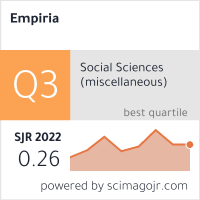Razón narrativa: De las virtudes cognitivas del relativo comparadas con las del modelo
DOI:
https://doi.org/10.5944/empiria.7.2004.967Keywords:
narración, relato, ciencias sociales, metodologíaAbstract
Se cuestiona aquí la autonomía cognitiva del relato, la supuesta originalidad cognitiva de lo narrativo. Las hipótesis interpretativas-explicativas transmitidas por un texto narrativo pueden —y deben— ser sometidas a evaluación según criterios epistemológicos generalizados en el ámbito científico. También se pone en cuestión que la modelización sea garantía por sí sola de cientificidad o que sea capaz de asegurar una mayor eficacia cognitiva que el relato. En su búsqueda de conocimiento, las ciencias sociales no tienen por qué elegir entre el relato y el modelo.
In this paper, it is called the cognitive autonomy of discourses into question, that is the supposed originality of the narratives. The interpretative-explanatory hypothesis transmitted by a narrative text can —and should— be assessed under epistemológica! criteria that must be widespread in the scientific fíeld. It also questions that modelling is in itself a warranty of scientifity and even that modelling gives us a better cognitive efficiency than that of the discourse. In their search for knowledge, social sciences have not a reason to choose between discourse and modelling.











